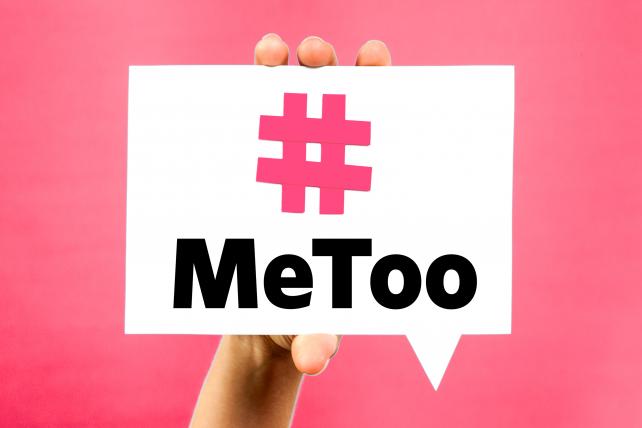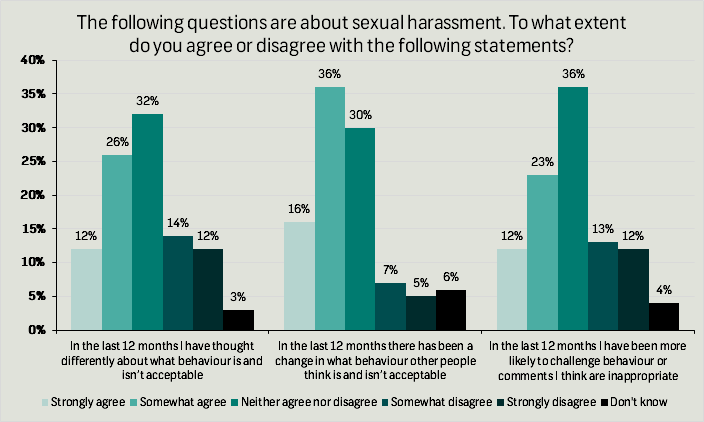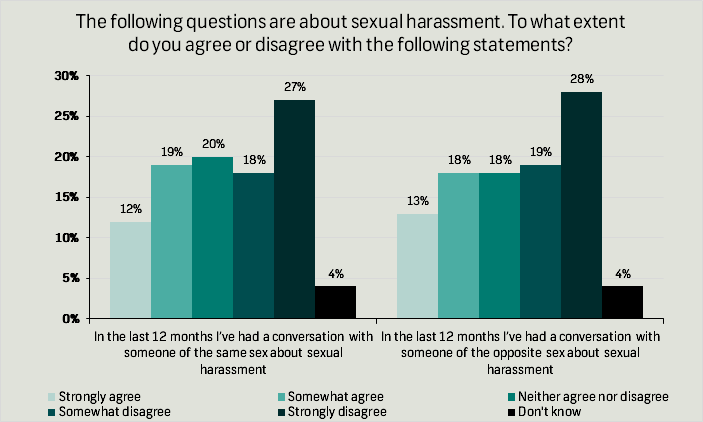
Over half (53%) of adults believe there has been a change in what behaviour people think is and isn’t acceptable a year after #MeToo
In October 2017 the hashtag #MeToo spread across Twitter drawing attention to the prevalence of sexual assault and harassment in society. Recent polling by Survation on behalf of the Fawcett Society helps reveal the impact that #MeToo has had in the last year.
Slightly under half of respondents (43%) had heard of #MeToo and of those 85% were able to correctly identify the definition. This equates to 36% of respondents being fully aware of the hashtag suggesting that although #MeToo was widely disseminated on social media it had less of a reach amongst the general population. This reflects both the focus and means of the campaign. Comparatively 27% of respondents had heard of the campaign Time’s Up (also raising awareness of sexual assault and discrimination) and 50% had heard of #BlackLivesMatter.
To assess the impact of #MeToo on society, respondents were asked whether in the last 12 months there had been changes in behaviour. These questions were asked to all respondents but the earlier questions about #MeToo were used to compare the changes amongst the wider society compared to those who were specifically aware of #MeToo (in this case the 36% who had both heard of the hashtag and could correctly identify its definition).

38% of respondents agreed to some extent that in the last 12 months they had thought differently about what behaviour is and isn’t acceptable. Those aware of #MeToo were more likely to say they had thought differently – 44% of those aware said they had thought differently compared to 34% of those unaware. #MeToo has had a greater effect on the younger generation – 54% of men under the age of 35 agreed that they had thought differently in the last 12 months compared to 27% of those aged over 55.
Respondents were also asked if they thought there had been a change in what behaviour other people think is and isn’t acceptable. A majority of all respondents (53%) agreed that there had been a change in the last 12 months. This included 69% of those aware of #MeToo and 46% of those unaware. Suggesting that respondents had seen a change within society since #MeToo even if they themselves had not changed behaviour.
35% of all respondents said that in the last 12 months they had been more likely to challenge inappropriate behaviour or comments. This rises to 38% of those aware of #MeToo, with the same percentage for those unaware as respondents as a whole.

31% of respondents agreed to some extent that in the last year they had had a conversation with someone of the same sex about sexual harassment. The same proportion said they had had a conversation with someone of the opposite sex. Women were more likely than men to say they had had a conversation with someone of the same sex whereas men were more likely to say they had had one with someone of the opposite sex. 34% versus 28% and 32% versus 31% respectively. Those aware of #MeToo were more likely than those not aware to have had a conversation (43% versus 25% for same sex and 44% versus 24% for opposite sex).
This poll suggests that #MeToo, alongside other campaigns, has had some impact on society but it is worth noting that 50% of respondents did say that the last 12 months had made no difference to them with regards to sexual harassment.
Survation polled 2056 adults aged 18+ in the UK online on behalf of the Fawcett Society. Fieldwork was between 13th and 14th August and 31st August and 2nd September 2018. Tables can be found here.
Survation is a member of the British Polling Council and abides by its rules.
Would you like to have your own views represented in Survation’s research work?
Survation’s paid consumer opinion panel is now live.
Simply go to: https://panel.survation.com/ – register (1 minute) and we’ll credit your account with 50 points for simply confirming your email and allocate 100 points for taking a very short survey. Points convert to cash which can be withdrawn each time you reach the equivalent of £50.
< Back

